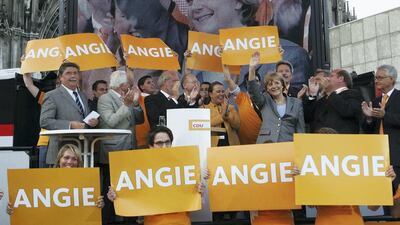Thirty years ago East and West Germany were reunited, to the celebration of the German people.
As the socialist German Democratic Republic - a client state to the Soviet Union and home to 16 million people - acceded to the Federal Republic of Germany, the ignominy of 45 years was consigned to the past.
In one of the final acts of the East German state, Prime Minister Lothar de Maiziere, the nation’s first and last democratically elected leader, spoke of the joy of the German people.
''In a few moments the German Democratic Republic accedes to the Federal Republic of Germany,” Mr De Maizere said.
“With that, we Germans achieve unity in freedom. It is an hour of great joy. It is the end of many illusions. It is a farewell without tears.''

Crowds sang the German national anthem, and the German flag was raised in front of the Reichstag building as midnight struck on October 3 1990.
In the streets of Berlin and other across Germany, hundreds of thousands of people celebrated Germany's reunification.
Celebrations for this year’s German Unity Day will be scaled back because of the coronavirus.
While Germany has emerged as one of the European nations to have best weathered the Coronavirus pandemic, traditional celebrations in the centre of Berlin have been pared back.
On Saturday, German Chancellor Angela Merkel will be joined by dignitaries in Potsdam for a morning ceremony marking the occasion.
Usual two-day celebrations have been replaced by 30 days of a so-called “Unity Expo” in Potsdam, on the outskirts of the German capital.
As the coronavirus has asked hard questions of all nations around the world, the 30th anniversary comes as Germany is forced to reckon with a changing global order.
On the eve of Germany’s unification, there were fears that the united Germany would become too powerful. At the time, Chancellor Helmut Kohl became the first Chancellor of the reunited state tried to assuage those concerns.
''Everybody should know: Germany will not go it alone, there will be no unilateral nationalism and no 'restless Reich,''' Mr Kohl wrote in an article for the Frankfurter Allgemeine newspaper in 1990.
Today, the spectre of the 20th Century, the devastation of the Second World War and the degradation of the Cold War years in the country still guide Germany’s foreign policy.
In a report released ahead of the 30th anniversary celebrations, the Munich Security Conference paints a picture of a nation too slow to adapt to a changing international order.
“Established foreign policy certainties of the Federal Republic are evaporating. This new situation is characterised by the dissolution of an international order built over decades, the rise of China, and a resurgence of power politics violating international norms,” the report asserts.
The German think tank highlights perceptions on the world stage that Berlin still does not pull its weight. “Germany’s commitment falls short not only of the expectations of its most important partners but also of the requirements arising from the strategic environment,” it says.
In the Middle East and North Africa, this is also apparent. In recent years, Germany has joined the French-led mission in Mali and sent weapons and aid to Kurdish fighters battling Isis in Iraq. “Despite this increased commitment, the accusation that Germany is a security policy free-rider remains,” the think tank said.
















